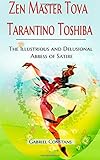 Reviewed by Carolyn Martinez
Reviewed by Carolyn Martinez
Zen Master Tova Tarantino Toshiba: The Illustrious and Delusional Abbess of Satire
by Gabriel Constans
Fountain Blue Publishing
Paperback: 150 pages, ISBN-13: 978-1628680454, August 1, 2014
Don’t be fooled, this is a work of pure fiction drawn from the mind of author, Gabriel Constans. Even the author’s note, which details the author’s ‘research’ is a work of fiction. This is not something I have come across before – a fictitious author’s note. Gabriel tells me the author’s note is tongue in cheek, intentionally written to seem serious and mimic the classic book Zen Flesh Zen Bones, which was first published in 1957 and is a real collection of historical zen stories and koans from Japan.
You’ll enjoy this book if you like satire, and are ready to take a light-hearted look at some of the things taken so seriously in life. “Everything taught, spoken of or shared in this book, is the opposite of what a real mindfulness teacher would say,” Constans tells me. The character in this book, teacher Zen Master Tova Tarantino Toshibo does what she wants, says whatever is on her mind and lives her life without much awareness at all.
She espouses gems such as, “Anger can be our friend. Keep it close at hand and when needed, let it off its leash… all too often, anger’s been given a bad rap.”
Under Self Evident, you’ll be challenged with two words, “explain yourself.”
Then you’ll join the journey of Sister Bonsia and Abbott Tova planting their hemp seeds.
What is interesting about this book is that it is presented in such a way as to appear serious and it is only in the fineprint that fiction is mentioned (and oh, I’ve just noticed the words “delusional” and “satire” in the title). If a newbie to zen philosophy picked it up, there’s enough sentences in this book to convince them it’s non-fiction; a book to be studied and unravelled. For instance, the book is littered with statements such as, “We must first clear out the closets of our mind, before we can be free… A mind cluttered with ideas, thoughts, the past, the future, or desire, will never find freedom.” I can see a newbie absorbing this sentence, taking it in, meditating on it. And then turning the page and reading, “Do bees dream of honey?” The poor newbie is left thinking, “oh, I have so much to learn … so much more enlightenment to go before I can understand all of Toshibo’s teachings!”
I can’t help feeling a little empathy for the uninitiated who pick up this book and believe it’s non-fiction. Good on you for reading the reviews first!
Enjoy the irony and laughs along the way. Those knowledgeable in the ways of Zen/Buddha/mindfulness, and those not fooled by a serious appearing author’s note, will “get” the abundant jokes.
Then again, perhaps I’m just an idiot for succumbing to what this newbie thought were real teachings slightly beyond my understanding in my first read through. Feel free to let me know. Actually don’t, I’m just remembering the anecdote of the Abbess being so still while meditating that painters, not seeing her, paint her into the fence. I can feel my body blushing. Is Constans way smarter than me, way funnier than me, or just mean?
About the reviewer: Carolyn Martinez is the author of Inspiring IVF Stories. She is the former owner/editor of The Westerner newspaper, and has a Master of Arts (Writing) through Swinburne University. She consults in corporate communications, and is currently writing her second book, Finding Love Again.